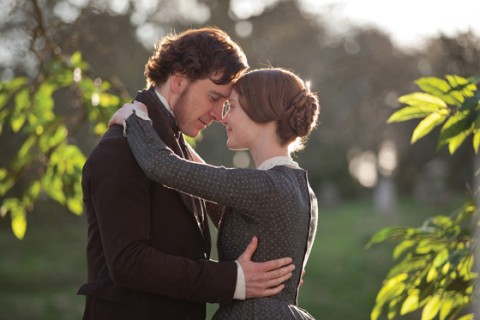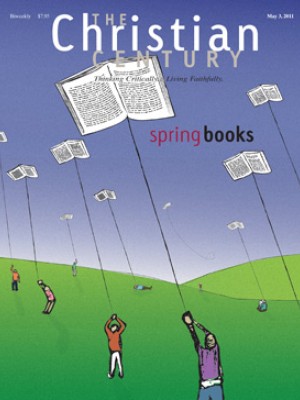Jane Eyre

Dramatic adaptations of Charlotte Brontë's Jane Eyre tend to go for romantic embroidery and Gothic grandiloquence. But the new movie version, directed by Cary Fukunaga, feels pared down in all respects except the emotional. It has a piercing ferocity.
Moira Buffini's expertly redacted screenplay gets to the heart of the novel, the passionate love affair of two intellectual equals who are also cursed souls: an unwanted 19-year-old orphan (Mia Wasikowska) hired on as a governess at a country estate called Thornfield, and her rich employer, Edward Rochester (Michael Fassbender), whose clandestine past follows him like a ghost. Buffini begins with Jane's desperate escape from Thornfield after her engagement to Rochester blows up in her face. Jane's attempt to reinvent herself is the frame for a series of flashbacks to her miserable childhood—first with the aunt who raises her without affection and then at Lowood School, a charitable institution run by a pitiless tyrant—and to her tenure at Thornfield, where she experiences freedom and love for the first time.
Read our latest issue or browse back issues.
Reconfiguring the narrative is a gamble that pays off brilliantly. St. John Rivers (Jamie Bell), the devout missionary who rescues Jane from starvation after she runs away from Thornfield, comes across as a humane but equally unyielding echo of Mr. Brocklehurst (Simon McBurney), the zealot in charge of Lowood. (Jane's childhood companion, the doomed Helen Burns, is a warmer, open-hearted Christian soul countering both these chilly men.) And St. John—who offers Jane marriage without love, both of them sacrificing their desires to toil for God—is a dim alternative to Rochester's heart-whole lover, willing to challenge social convention to win the woman he adores.
Brontë wrote a love story about two highly cultivated but unprepossessing people. Yet the 1944 Hollywood movie featured two glamorous stars: Joan Fontaine in a bad haircut claiming not to be beautiful and the youthful Orson Welles pretending not to be handsome. Wasikowska (Alice in Wonderland, The Kids Are All Right) and Michael Fassbender (Inglourious Basterds) certainly hold the camera, but as actors, not as movie stars. They share the kind of powerful chemistry that arises from the acknowledgment that sexuality begins in the head. This Rochester falls in love with Jane because she has a truly independent spirit uncrushed by the cruelty she has faced. She refuses to cower before her master, and her loyalty is as steadfast as her courage.
The love scenes in the 1944 version were a triumph of lighting and production design. Played by Wasikowska and Fassbender, they have an almost shocking sexual intensity. Wasikowska gives a performance of admirable purity and intelligence, and Fassbender is amazing, especially in the later, anguished scenes. While it's customary to think of Rochester as brooding, Fassbender's Rochester is possessed—a soul in hell with a vision of heaven before his eyes.
This Jane Eyre is so focused on the actors that it may take a while to notice how good Adriano Goldman's cinematography is, or the work of production designer Will Hughes-Jones and costume designer Michael O'Connor. (On the other hand, it's hard to miss the beauty of Dario Marianelli's score.) The ensemble has been cast with the same perspicacity as the leads. Bell's St. John helps the post-Thornfield scenes skirt the danger of falling into monotony; in the book, you can see what Brontë is up to with this character, but you grow impatient for Rochester's return. The two young actresses who play Jane and Helen in the childhood scenes, Amelia Clarkson and Freya Parks, could hardly be improved upon.
The only casting error is Sally Hawkins as Aunt Reed. Hawkins has a slightly neurotic quality, which the filmmakers might have put to use if they'd dramatized Brontë's depiction of the character's unsettled response to young Jane's outburst of rancor before departing her house. But in this adaptation Aunt Reed is merely unpleasant.
On the other hand, Judi Dench finds all the colors possible in Thornfield's housekeeper, Mrs. Fairfax. Dench touches on the character's class consciousness, easily scandalized conventionality and lack of imagination but also her sensitivity and maternal protectiveness of the young governess who is her only friend on the estate. When Jane accepts Rochester's proposal of marriage, Mrs. Fairfax fears for her—and her uneasiness turns out to be justified. The even-handedness of the movie's treatment of this important supporting character is indicative of what makes it a superior literary adaptation.





